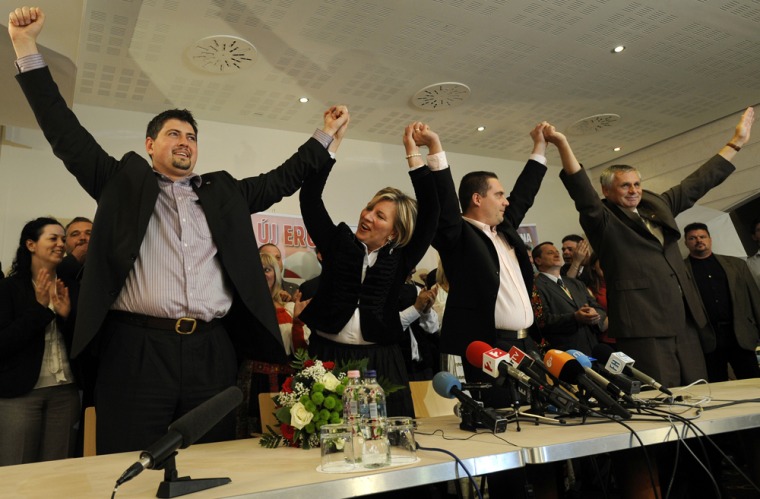Center-right parties hailed European Parliament election victories as a continent-wide vote against stimulus spending and corporate bailouts and pledged Monday to forge ahead with conservative solutions to the economic crisis.
Right-leaning governments came out ahead in Germany, France, Italy and Belgium, while conservative opposition parties won in Britain, Spain, and Bulgaria. Far-right groups also made gains in Britain, Austria, the Netherlands and Hungary.
Many Socialists ran campaigns that slammed center-right leaders for failing to regulate financial markets and spend enough to stimulate faltering economies. But voters did not embrace their cause.
Center-right parties called Monday for pragmatic anti-recession measures that shied away from big stimulus.
European People's Party leader Joseph Daul said his group of center-right national parties would back a 19 billion euro ($27 billion) EU plan that allocated no new money for stimulus, instead requiring European governments to more quickly spend existing EU funds on job-creation. Other priorities include common immigration and energy policies to reduce the number of illegal migrants and to lessen Europe's dependence on Russian natural gas exports.
Fighting climate change was also a priority for the center-right, which still favors spending more than Europe's free-market Liberal Democrats or many conservatives in the United States.
Defeat for Brown; rise of all-white party
British Prime Minister Gordon Brown's center-left Labour party finished third behind the anti-European U.K. Independence Party — a crushing defeat that cast more doubt on Brown's future. The Conservatives are expected to win Britain's next national elections.
The vote also saw the all-white British National Party pick up two seats in the EU assembly — joining far-right parties from the Netherlands, Hungary and Austria that excoriated Muslims, immigrants and minorities.
The EU parliament has evolved over five decades from a consultative legislature to one with the power to vote on or amend two-thirds of all EU laws, on issues ranging from climate change to cell-phone roaming charges.
The parliament can also amend the EU budget — 120 billion euro ($170 billion) this year — and approves candidates for the European Commission, the EU administration and the board of the European Central Bank.
But the Europe-wide elections were most important as a snapshot of national political sentiment.
The June 4-7 elections that ended Sunday across the 27-nation bloc saw only 43 percent of 375 million eligible voters cast ballots for representatives to the 736-seat EU legislature. The record low turnout pointed to enduring voter apathy about the European Union.
Latest EU projections showed center-right parties were expected to take the most seats — 263. Center-left parties were headed for 163. Green and pro-EU parties captured 52 seats, while far-right and anti-EU parties won around 40 seats. The remainder went to smaller groupings.
Greece, Hungary and Malta go left
Conservative success was not uniform across Europe. Voters angry over unemployment, inflation and political scandals punished right-leaning ruling parties in Greece, Hungary and the tiny island of Malta.
Poul Nyrup Rasmussen, president of the European Socialists group, said his center-left member parties would "continue to fight" for more money.
"Europe still needs a new direction. We are in the middle of a recession and it will not go away," he said.
Germans handed a lackluster victory to Chancellor Angela Merkel's conservatives but a historic defeat to their center-left rivals, a result that comes only months before Germany holds its own national election.
"We are the force that is acting level-headedly and correctly in this financial and economic crisis," said Volker Kauder, the leader of Merkel's party in the German parliament.
Sarkozy's party trounces opposition
French President Nicolas Sarkozy's governing conservatives trounced the Socialists, while an ecology-minded party vaulted to a surprisingly strong third place.
Voters in Italy handed a tepid win to scandal-plagued Premier Silvio Berlusconi and rewarded the anti-immigrant party in his coalition. The 72-year-old billionaire media mogul spent much of the campaign fighting off his wife's allegations of an improper relationship with an 18-year-old model.
Austria's big winner was the rightist Freedom Party, which more than doubled its strength over the 2004 elections to 13.1 percent of the vote. It campaigned on an anti-Islam platform.
In the Netherlands, Geert Wilders' anti-Islamic party took 17 percent of the country's votes, winning four of 25 seats.
Three of 22 seats in Hungary went to the far-right Jobbik party, which describes itself as Euro-skeptic and anti-immigration. Critics say the party is racist and anti-Semitic.
More on: European Union
